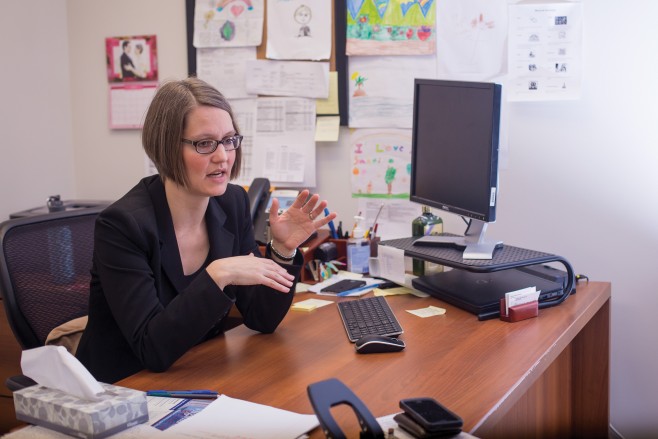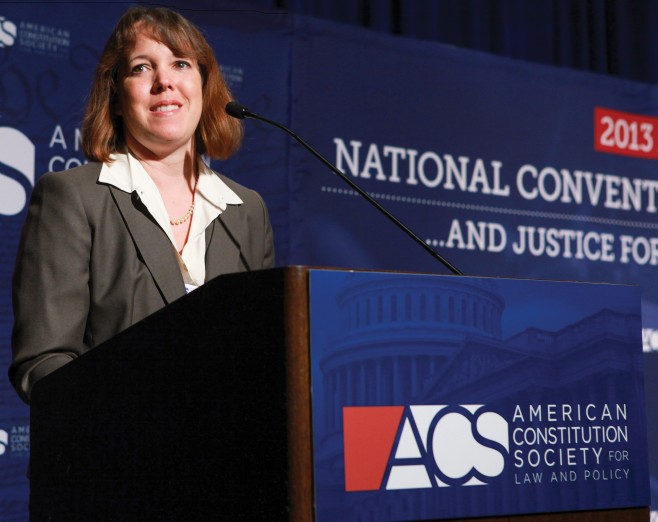
Washington D. C. attorney Shanti Martin Brown ’01 is an expert in Special Immigrant Juvenile Status, a little-known provision within federal law. (Photo by Jon Styer)
No matter who you are, navigating the American legal system can be daunting. If you’re a poor, undocumented immigrant, it can be a lot worse than that.
“This is a seriously marginalized group in the United States…. It’s very easy in the system for the rights of an indigent, unrepresented, undocumented immigrant to be completely plowed over,” says Shanti Martin Brown ’01, staff attorney with Ayuda, a nonprofit that offers legal, social and language services to immigrants in and around Washington D.C.
Martin Brown spends about half her time helping abused or abandoned immigrant children apply for a status that provides a path to citizenship (known as Special Immigrant Juvenile Status, or SIJS) under a little-known provision of federal law. It’s a complicated process involving a family court at the state level followed by an administrative ruling from the U.S. Citizenship and Immigration Services. Few applicants for SIJS can afford an attorney, and almost none would be able to navigate the process on their own, says Martin Brown, who earned her law degree from American University’s Washington College of Law in 2009.
“It’s amazing to be able to empower these clients by providing representation,” she says.
To qualify for SIJS, children have to have suffered some form of abuse or neglect, and often have to tell their harrowing stories in court. That means the process can be emotionally draining for both Martin Brown and her clients. At the same time, Ayuda carefully screens cases to make sure those who apply for SIJS are eligible for it.
“What is so rewarding about the work is that 99% of the cases we win, and these clients are then granted legal status in the U.S,” she says. “There’s a happy ending, and you can see the transformation in the clients.”
In Portland, Oregon, Christa Obold Eshleman ’97 is a staff attorney at Youth, Rights & Justice, which has a state contract to provide court-appointed counsel for children and parents in the juvenile court system. Because SIJS requires an order from a juvenile court finding that a child has suffered abuse, abandonment or neglect from his or her parents, Obold Eshleman occasionally works on behalf of clients seeking this status. (The majority of her current practice involves representation of non-immigrant children and parents at the appellate level.)
She traces an interest in immigration law back to her year with EMU’s Washington Community Scholars’ Center, during which she interned in Mennonite Central Committee’s Washington D.C. office. The director of that office was J. Daryl Byler ’79, an attorney who now heads EMU’s Center for Justice and Peacebuilding.
“That was my first introduction to Mennonites as lawyers,” she recalls. “I was very impressed with the work that they were doing through their law degrees and started thinking about that as a viable career option.”

Kara Hartzler ’94 speaks upon accepting the David Carliner Public Interest Award from the American Constitution Society in 2013.
A cross-cultural to Central America further opened her eyes to refugee and immigration issues. After college Obold Eshleman did voluntary service terms with legal organizations in San Francisco and Dallas; in Dallas, she worked specifically in immigration law. She then went to law school at the University of Notre Dame.
Like many Mennonite lawyers, Obold Eshleman is familiar with and sympathetic toward the values, theories and practices of restorative justice, as well as the criticisms it levels against the adversarial nature of the traditional justice system. While she continues to appreciate and support restorative justice work, she says her years serving as a public defender have convinced her of the importance of the adversarial system in advancing the cause of justice for marginalized and powerless members of our society.
“The only way to develop a system of rights that works for the whole population is if you’ve got public defenders who are fighting every step of the way,” she says. “Over the years, my thinking has evolved to essentially being that it’s really important that we have a working legal system. Sometimes it’s only through the adversarial process that we get good law, and I think having good law is important to having a functional country to live in.”
This is a perspective that resonates with Kara Hartzler ’94, who works in the federal public defender’s office in San Diego, California. Most of her work is also at the appellate level, representing immigrants who have been convicted of federal crimes.
“That’s a segment of society that is not very popular in the United States … and I strongly believe that the government has a tendency to overlook their rights,” she says. “I feel very called to be present with those people who are reviled, and to be an advocate for them … when they’re going through what is quite possibly one of the scariest and most traumatic times in their lives.”
(Illegal entry into the country and other immigration-related crimes now account for more than half of all prosecutions in U.S. federal courts. People convicted on these charges can face lengthy prison terms.)
Hartzler, who grew up in a Mennonite family in Hesston, Kansas, also felt “pretty sheepish about being a lawyer” earlier in her life – particularly the sort of lawyer who regularly faces adversaries in the courtroom. Like Obold Eshleman’s, her thoughts on the matter have also changed when it comes to representing clients – mostly immigrants – whose rights are often violated by a seemingly monolithic system. Creating and maintaining a just and equal society in her view means someone has to push back.
Hartzler got a first taste for immigration law at a law clinic in Texas where she worked during a voluntary service term after EMU. She later went on to earn an MFA in playwriting and a law degree from the University of Iowa. One of her plays, No Roosters in the Desert, was based on interviews with migrant women by a professor at the University of Arizona. Focused on four Latino women trying to enter the United States through southern borderland, No Roosters in the Desert has been performed in Mexico and across the United States, including at EMU in 2012.
After she earned her law degree, Hartzler lived in Mexico for a while, where she gained new understanding of the issues surrounding immigration from the other side of the border.
“I think there’s often a misperception in the United States that ‘they just want to come here and enjoy our life,’” she says. “People who generally emigrate are doing so out of a sense that there is no other option, that they don’t have the ability to support their families, that they won’t be safe if they stay there.”